Voices February 2021
You & Oxfam, tackling poverty together
Thanks to you
In the last year, our life-changing programs empowered more than 9.4 million people in 84 countries around the world with the training, resources and opportunities they need to lift themselves out of poverty. Worldwide, we reached 12.3 million people affected by disaster or conflict with life-saving aid. And here at home, we empowered and inspired more than 16,000 people with our programs, campaigns and coalition initiatives for Australia’s First Peoples.
With support and solidarity from kind, caring people like you, we’ve changed so many people’s lives for the better. Below you’ll meet just a few of the many people around the globe whose lives have been uplifted thanks to your compassion and generosity. Thank you.
With support and solidarity from kind, caring people like you, we’ve changed so many people’s lives for the better. Below you’ll meet just a few of the many people around the globe whose lives have been uplifted thanks to your compassion and generosity. Thank you.
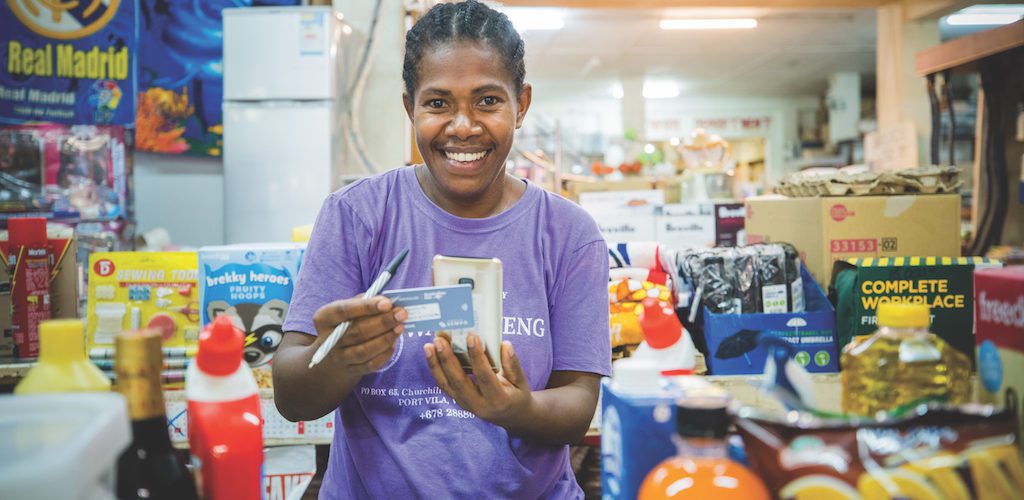
Photo: Arlene Bax/Oxfam in Vanuatu.
Instant aid via blockchain
Does a faster, cheaper, more transparent system for getting emergency aid to people in crisis sound like a good idea? It is! And that’s why we’re leading a blockchain revolution.
When disasters strike, cash is often the most practical and immediate type of support we can offer affected communities.
Now, using blockchain technology, we can deliver emergency cash instantly.
A year after the groundbreaking pilot of the UnBlocked Cash project, Oxfam in Vanuatu has joined forces with 17 local and international partners to scale the blockchain-based cash and voucher assistance solution across the world — starting in the Pacific nation of Vanuatu.
More than 35,000 people affected by Cyclone Harold and COVID-19 are set to receive support via UnBlocked Cash. The project provides a single payment platform that not only delivers swift cash assistance to those in need but also boosts the local economy in the wake of disaster.
Now, using blockchain technology, we can deliver emergency cash instantly.
A year after the groundbreaking pilot of the UnBlocked Cash project, Oxfam in Vanuatu has joined forces with 17 local and international partners to scale the blockchain-based cash and voucher assistance solution across the world — starting in the Pacific nation of Vanuatu.
More than 35,000 people affected by Cyclone Harold and COVID-19 are set to receive support via UnBlocked Cash. The project provides a single payment platform that not only delivers swift cash assistance to those in need but also boosts the local economy in the wake of disaster.
Powered by Aussie fintech Sempo, UnBlocked Cash brings aid into the 21st Century. It saves the cost of distributing aid by up to 75%, cuts delivery times by more than 90%, and brings more transparency and accountability in the process.
“We are changing the existing approach of delivering aid through automating and tracking payments using a platform to convene NGOs regardless of their experience with cash transfers,” says Oxfam’s Sandra Uwantege Hart, who designed the project.
“The platform allows for seamless coordination of resources, which in many places — like Vanuatu — remain untapped. Now, we are able to expand our cash assistance capabilities with multiple partners including, among others, World Vision, Save the Children, the Vanuatu Red Cross and the Government of Vanuatu.”
This is a huge advantage in the Pacific region, where financial infrastructure is limited and the operating environment is complex. The region experiences some of the most devastating impacts of climate change and the population is scattered across more than 25,000 islands.
UnBlocked Cash has been designed as a user-centered solution empowering the beneficiary communities and local shops in their own economic recovery and development. Participating vendors receive android smartphones with a pre-installed Sempo payments app and are trained in basic digital skills. Enrolled households receive e-voucher cards, which can be tapped on vendor phones to pay for goods.
The unique feature of the Vanuatu program design is a vendor-to-vendor cash-out, where vendors can exchange their digital tokens into a local flat currency between themselves, or purchase goods from each other without any intermediaries. NGOs like Oxfam can monitor transactions remotely and in real-time via an online platform.
Priscilla Tabe (pictured) is a participating vendor from Sarakata, Santo. She says, “I’m glad to join the program. I think it will benefit local businesses as well as people in the communities because they can choose what they want. It’s very interesting seeing how technology can be used to provide assistance to people at the grassroot level.”
The innovative use of digital currency — in this case, a digitised version of the local currency in the form of a collateralised blockchain token — ushers in a new era of digital financial inclusion and access in Vanuatu, where most people don’t have access to brick-and-mortar banking services.
“The platform allows for seamless coordination of resources, which in many places — like Vanuatu — remain untapped. Now, we are able to expand our cash assistance capabilities with multiple partners including, among others, World Vision, Save the Children, the Vanuatu Red Cross and the Government of Vanuatu.”
This is a huge advantage in the Pacific region, where financial infrastructure is limited and the operating environment is complex. The region experiences some of the most devastating impacts of climate change and the population is scattered across more than 25,000 islands.
UnBlocked Cash has been designed as a user-centered solution empowering the beneficiary communities and local shops in their own economic recovery and development. Participating vendors receive android smartphones with a pre-installed Sempo payments app and are trained in basic digital skills. Enrolled households receive e-voucher cards, which can be tapped on vendor phones to pay for goods.
The unique feature of the Vanuatu program design is a vendor-to-vendor cash-out, where vendors can exchange their digital tokens into a local flat currency between themselves, or purchase goods from each other without any intermediaries. NGOs like Oxfam can monitor transactions remotely and in real-time via an online platform.
Priscilla Tabe (pictured) is a participating vendor from Sarakata, Santo. She says, “I’m glad to join the program. I think it will benefit local businesses as well as people in the communities because they can choose what they want. It’s very interesting seeing how technology can be used to provide assistance to people at the grassroot level.”
The innovative use of digital currency — in this case, a digitised version of the local currency in the form of a collateralised blockchain token — ushers in a new era of digital financial inclusion and access in Vanuatu, where most people don’t have access to brick-and-mortar banking services.
Our blockchain solution may be high-tech, but it is simple to use and revolutionising the delivery of humanitarian aid.
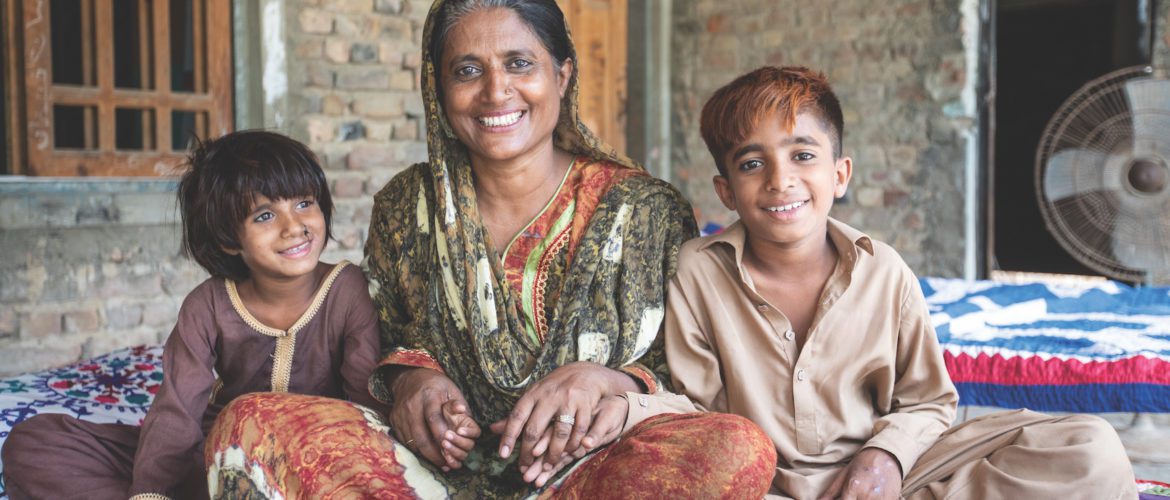
Photo: Khaula Jamil/OxfamAUS
Demanding her fair share
Access to clean water is a contentious topic in Sara Solangi’s village in Pakistan. But thanks to you, women like Sara are standing up to demand their fair share.
“It has been very difficult for us to live here,” Sara says. “We lack access to basic amenities, like gas and water. To fetch water, we have to cover miles of distance.”
“The water doesn’t flow down from the source … They use it all further up the line and it never reaches us. Feudal lords have made dams and they keep all of the water that is supposed to flow down to us.”
“The lands lay uncultivated owing to the scarcity of water.”
“We have argued our case with feudal lords but they simply turned us away in contempt.”
In 2019, we reached out to our supporters to help women like Sara tackle poverty — and the response was nothing short of amazing. Thanks to the generous support of people like you, Oxfam’s Women, Water and Peace-building project empowers women in Pakistan with the skills and resources they need to access clean water and lift themselves out of poverty.
Inspired by the leadership training she received from her Oxfam-supported community group, Sara has decided to take a stand. She spent the last three years campaigning for her village to gain fair and equal access to water, leading the way for other women to speak up and be heard by feudal lords and local Ministers. Sara once feared talking to strangers and politicians — but that has all changed. “I no longer tremble at their sight,” she says.
“The water doesn’t flow down from the source … They use it all further up the line and it never reaches us. Feudal lords have made dams and they keep all of the water that is supposed to flow down to us.”
“The lands lay uncultivated owing to the scarcity of water.”
“We have argued our case with feudal lords but they simply turned us away in contempt.”
In 2019, we reached out to our supporters to help women like Sara tackle poverty — and the response was nothing short of amazing. Thanks to the generous support of people like you, Oxfam’s Women, Water and Peace-building project empowers women in Pakistan with the skills and resources they need to access clean water and lift themselves out of poverty.
Inspired by the leadership training she received from her Oxfam-supported community group, Sara has decided to take a stand. She spent the last three years campaigning for her village to gain fair and equal access to water, leading the way for other women to speak up and be heard by feudal lords and local Ministers. Sara once feared talking to strangers and politicians — but that has all changed. “I no longer tremble at their sight,” she says.
We used to be so afraid of our rights, but now I have grown more confident and can actually speak up about it. At first, I wouldn’t even be able to open my mouth. Wherever they take us now, we are ready to go and talk about it.
Sara did not have equal access to education as a child, but she wants a better life for her kids (pictured).
“My son goes to school, he’s in Class 4. It is really important to me that my children have an education.
“My prayer is that he comes to Australia to see you in your home town, that is how successful I hope he becomes. I hope he becomes independent and is able to travel the world.”“I wish for prosperity and development to come to my village … I firmly believe that education is the key and that we will be able to achieve prosperity with education.”
“My son goes to school, he’s in Class 4. It is really important to me that my children have an education.
“My prayer is that he comes to Australia to see you in your home town, that is how successful I hope he becomes. I hope he becomes independent and is able to travel the world.”“I wish for prosperity and development to come to my village … I firmly believe that education is the key and that we will be able to achieve prosperity with education.”
We’re got plenty of inspiring stories about how our gender justice work has enabled women to earn, learn and lead in their communities.
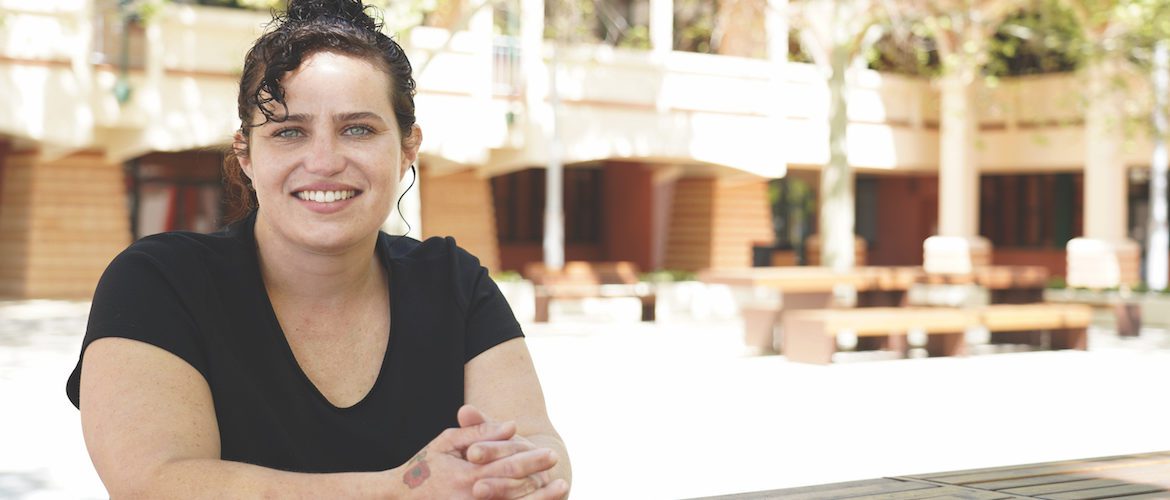
Photo: Reginald Ramos/OxfamAUS
Leaders in the making
Wongutha woman Rae Cottam attended a National Straight Talk Summit in 2015. Then, in 2019, she became the youngest First Nations woman to be elected to local government.
Over the last decade, our Straight Talk program has had the privilege of hosting hundreds of passionate Aboriginal and Torres Strait Islander women — and many have gone on to become inspiring leaders in their communities and beyond.
Straight Talk connects women with the political system, empowering them with the skills, confidence and know-how to effect positive change.
For Rae Cottam, Councillor for Rockingham, Straight Talk solidified a long-held desire to bring about change. “When I was a young person [growing up in Perth on Noongar Country] I wanted to become a student councillor. I had a Councillor living up the street from me and she said, ‘You can be a councillor if you wanted to’,” recalls Cottam. “It really resonated with me that I could do that. So primary school, I became a student councillor and then in high school I went on student council and became a school captain.”
After school, Cottam worked in various social sectors — parenting support, education, disability support — and her desire to help her community intensified. “I’m a problem solver,” she says.
Straight Talk connects women with the political system, empowering them with the skills, confidence and know-how to effect positive change.
For Rae Cottam, Councillor for Rockingham, Straight Talk solidified a long-held desire to bring about change. “When I was a young person [growing up in Perth on Noongar Country] I wanted to become a student councillor. I had a Councillor living up the street from me and she said, ‘You can be a councillor if you wanted to’,” recalls Cottam. “It really resonated with me that I could do that. So primary school, I became a student councillor and then in high school I went on student council and became a school captain.”
After school, Cottam worked in various social sectors — parenting support, education, disability support — and her desire to help her community intensified. “I’m a problem solver,” she says.
So I figured out I could do something here in my community and I knew that, to make change, the first step would be as a Local Government Councillor. And then I knew the next steps from there would be a Federal seat for Parliament.
Cottam had heard strong positive feedback from other women about Straight Talk, so in 2015 she applied for and attended the National Summit.
“I heard that women go, come back to our communities, and transform themselves and the work that they do. And I thought, ‘I want to get on board with this’. “I went to Canberra in 2015 — and it blew my mind … just to know what’s happening at Capitol Hill.
Oxfam really opened up my world to that.” Cottam says she learnt a great deal about the political system, the First Peoples pioneers who dedicated their lives to bringing about change, and how to be a change-maker herself.
“Straight Talk helps you recognise your responsibility to yourself, to your community, to your people, and recognise what you can do within that space,” says Cottam. She adds that the sisterhood created by the program is also powerful.
“Being connected to a network of women that are like-minded, who are positive, strong women who can back you up and give you a little bit of fire to ignite you, that is something really strong to belong to and I’ve never found that with anything else that I’ve done in my life.”
“I heard that women go, come back to our communities, and transform themselves and the work that they do. And I thought, ‘I want to get on board with this’. “I went to Canberra in 2015 — and it blew my mind … just to know what’s happening at Capitol Hill.
Oxfam really opened up my world to that.” Cottam says she learnt a great deal about the political system, the First Peoples pioneers who dedicated their lives to bringing about change, and how to be a change-maker herself.
“Straight Talk helps you recognise your responsibility to yourself, to your community, to your people, and recognise what you can do within that space,” says Cottam. She adds that the sisterhood created by the program is also powerful.
“Being connected to a network of women that are like-minded, who are positive, strong women who can back you up and give you a little bit of fire to ignite you, that is something really strong to belong to and I’ve never found that with anything else that I’ve done in my life.”
The next National Straight Talk Summit will be held in 2021 in Canberra, and aims to bring people together to share, learn and be effective in making a difference.
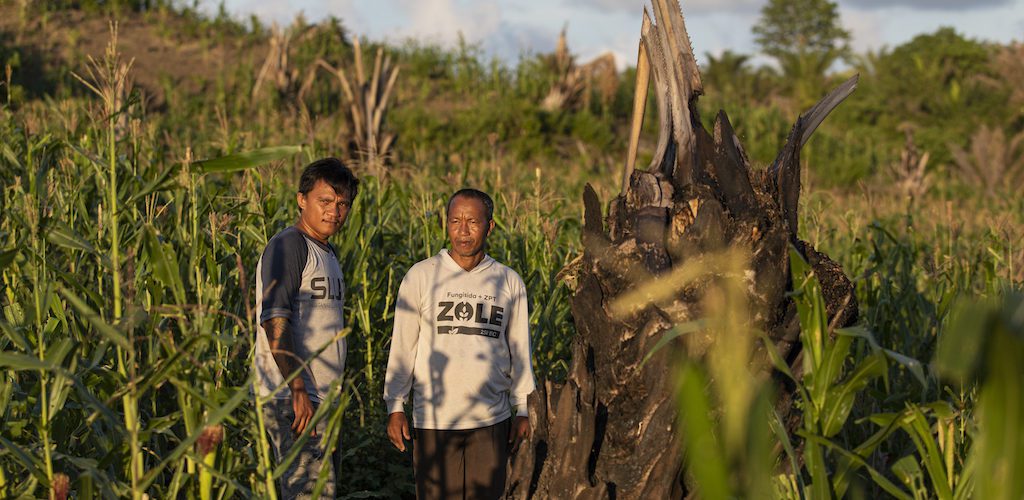
All photos: Ilvy Njiokiktjien/Oxfam.
Taking back their land
Meet some of the people who are challenging big palm oil companies and taking back what’s theirs.
Palm oil is an extremely versatile oil with many different properties, so it is widely used in everything from donuts to deodorant. But as global concerns about climate change have peaked in the last decade, so too have concerns about the sustainability of palm oil production.
Palm oil is a major driver of deforestation of some of the world’s most biodiverse forests, destroying the habitats of already endangered species. Between them, Indonesia and Malaysia supply more than 85% of the world’s palm oil. Industry expansion in Indonesia has been linked to very high carbon emissions from drained peatlands which, as the soils dry, become increasingly fire prone, causing further environmental harm.
And the environment is not the only casualty of palm oil production. In Central Sulawesi, Indonesia, powerful palm oil companies stand accused of land grabs, forcing small-scale farmers from their traditional lands and livelihoods. But thanks to the support of people like you, we partnered with local organisation Transformasi untuk Keadilan (TuK) — a staunch advocate for people’s rights with regard to the environment and natural resources — to help affected communities.
Together, we’re arming farmers with the skills and confidence to take a stand and reclaim their lands.
Palm oil is a major driver of deforestation of some of the world’s most biodiverse forests, destroying the habitats of already endangered species. Between them, Indonesia and Malaysia supply more than 85% of the world’s palm oil. Industry expansion in Indonesia has been linked to very high carbon emissions from drained peatlands which, as the soils dry, become increasingly fire prone, causing further environmental harm.
And the environment is not the only casualty of palm oil production. In Central Sulawesi, Indonesia, powerful palm oil companies stand accused of land grabs, forcing small-scale farmers from their traditional lands and livelihoods. But thanks to the support of people like you, we partnered with local organisation Transformasi untuk Keadilan (TuK) — a staunch advocate for people’s rights with regard to the environment and natural resources — to help affected communities.
Together, we’re arming farmers with the skills and confidence to take a stand and reclaim their lands.
A farmer on the frontline
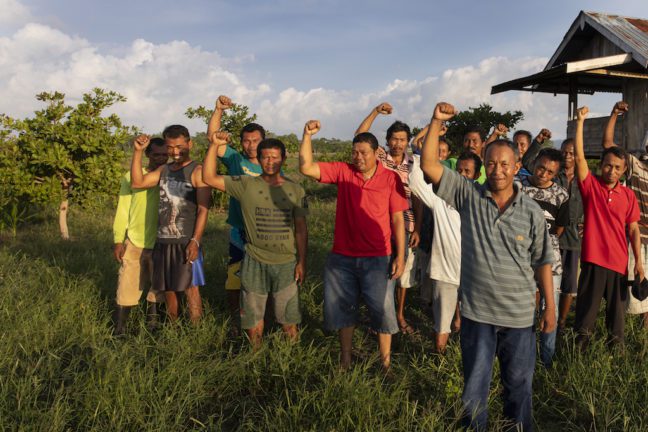
Agus Tatu is the leader of his local farmers association. He was forced to migrate from North Sulawesi after his family’s land was grabbed by sugar company WMP.
Agus moved to Central Sulawesi with more than 20 families from his former village and they are still a very close-knit farming collective. They work their land together and, with support from Oxfam’s partner TuK, they also fought alongside one another to reclaim their land.
In 2014, they reclaimed 150 of the 180 hectares that had been seized for palm oil production. Before they could rehabilitate the lands for farming, they had to destroy the palm oil plantation, either shearing off the trees’ leaves to hinder palm nut growth or pouring insecticide in the top of the trees before burning them from the base.
Agus is not proud of the destruction. “The trees can’t help it,” he says.
Agus reflects on the battle for his land: “TuK strengthened our fight with knowledge about the legal framework, human rights on life, education and food, and farmers rights on land and fair value chains. This helped us to not give up and turn the government from an enemy into an ally.
“We now have good relations and work together on sustainable agribusiness. We have convinced the government that agriculture instead of palm oil is a promising and profitable business.”
In 2019, WMP accused Agus and nine of his fellow farmers of stealing crops and timber from the company’s land. With support from TuK, the farmers stood up to the company and proved their land rights.
“Whenever we have a problem, I turn to Kiki and Vera [from TuK] for support,” Agus says.
“They have never failed us with their commitment and loyalty.”
Agus moved to Central Sulawesi with more than 20 families from his former village and they are still a very close-knit farming collective. They work their land together and, with support from Oxfam’s partner TuK, they also fought alongside one another to reclaim their land.
In 2014, they reclaimed 150 of the 180 hectares that had been seized for palm oil production. Before they could rehabilitate the lands for farming, they had to destroy the palm oil plantation, either shearing off the trees’ leaves to hinder palm nut growth or pouring insecticide in the top of the trees before burning them from the base.
Agus is not proud of the destruction. “The trees can’t help it,” he says.
Agus reflects on the battle for his land: “TuK strengthened our fight with knowledge about the legal framework, human rights on life, education and food, and farmers rights on land and fair value chains. This helped us to not give up and turn the government from an enemy into an ally.
“We now have good relations and work together on sustainable agribusiness. We have convinced the government that agriculture instead of palm oil is a promising and profitable business.”
In 2019, WMP accused Agus and nine of his fellow farmers of stealing crops and timber from the company’s land. With support from TuK, the farmers stood up to the company and proved their land rights.
“Whenever we have a problem, I turn to Kiki and Vera [from TuK] for support,” Agus says.
“They have never failed us with their commitment and loyalty.”
Fighting the good fight
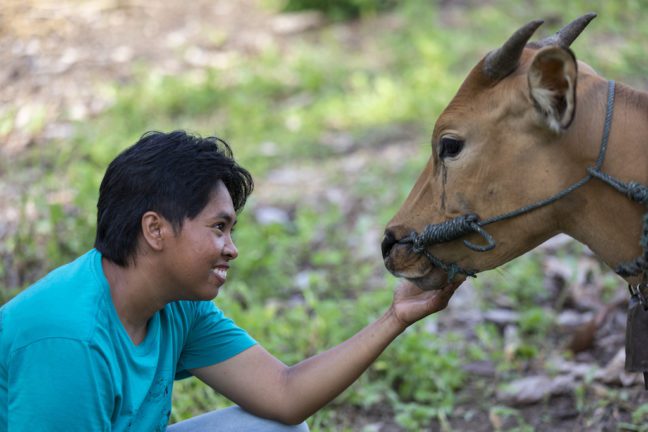
Vera Falinda worked with Oxfam’s partner TUK until 2018. In that time, she supported the development of village governance, gender justice and fair finance for local farmers. Through Oxfam’s program,” Vera says, “we built farmers’ capacity. We explained that farmers have rights, including right to land.”
“I want farmers to keep their land not only for themselves, but for future generations. Statistics show that the number of young farmers continue to decline. Therefore, I must work directly with farmers so that young people in villages will be motivated to farm and keep their land.”
She believes the fight for land rights should be positive and constructive — not fighting directly with the companies but, rather, strengthening the farmers’ coping mechanisms.
Vera’s personal motivation stems from her childhood, when her parents were forced to sell their ancestral land to pay their debts. This experience, early in life, helped to shape Vera’s direction and sense of purpose.
When Vera’s work with TuK in the Bangaii district ended, she started her own NGO, Aswangga, so she could stay on and keep supporting the community. She has dedicated her heart to the people and the region. With Aswangga, Vera aims to connect farmers with investors, so that they aren’t forced to sell off their land when they run into financial hardship. “I’ve now linked investors and farmers, to obtain more benefits compared to saving in banks,” she says.
“We’ve done financial literacy training, but then farmers could not apply the training. So I’m now focusing on facilitating farmers to implement, every day or month, the trainings.”“I believe whatever farming challenge there is, the most important is to develop a fair partnership with investors and farmers, especially for the environment. Everything in this planet must be interconnected, while prioritising sustainability.
If we don’t protect the planet, who will?”
“I want farmers to keep their land not only for themselves, but for future generations. Statistics show that the number of young farmers continue to decline. Therefore, I must work directly with farmers so that young people in villages will be motivated to farm and keep their land.”
She believes the fight for land rights should be positive and constructive — not fighting directly with the companies but, rather, strengthening the farmers’ coping mechanisms.
Vera’s personal motivation stems from her childhood, when her parents were forced to sell their ancestral land to pay their debts. This experience, early in life, helped to shape Vera’s direction and sense of purpose.
When Vera’s work with TuK in the Bangaii district ended, she started her own NGO, Aswangga, so she could stay on and keep supporting the community. She has dedicated her heart to the people and the region. With Aswangga, Vera aims to connect farmers with investors, so that they aren’t forced to sell off their land when they run into financial hardship. “I’ve now linked investors and farmers, to obtain more benefits compared to saving in banks,” she says.
“We’ve done financial literacy training, but then farmers could not apply the training. So I’m now focusing on facilitating farmers to implement, every day or month, the trainings.”“I believe whatever farming challenge there is, the most important is to develop a fair partnership with investors and farmers, especially for the environment. Everything in this planet must be interconnected, while prioritising sustainability.
If we don’t protect the planet, who will?”
Protecting her plot
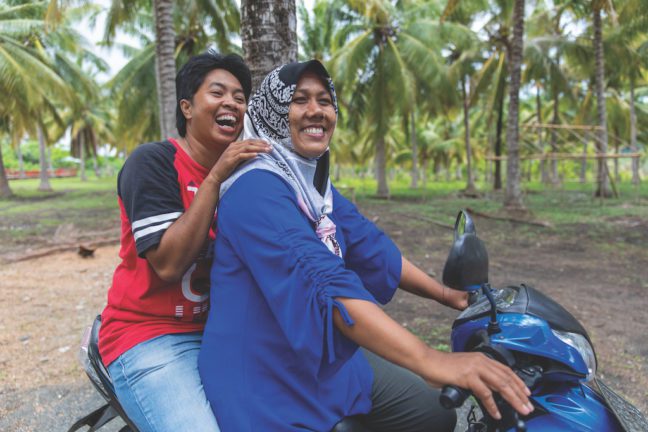
Today, Umiyata (pictured right) is the proud owner of a flourishing farm with 20 cows — but she had to put up quite a fight for it.
When Umiyata was a small child, her family migrated from Java and secured two hectares of farming land, where they cultivated corn and soy beans. Life on the land was hard. And it got much harder in 2010, when sugar company WMP grabbed her land to produce palm oil.
Land certificates are costly in Indonesia — you pay for the measurement, administration and taxes — and Umiyata’s family could not afford the expense, so they couldn’t stand in the way of the land grab. For the next four years, they felt powerless.
They agreed to take part in the Plasma scheme — a government initiative mandating palm oil companies to allocate one fifth of their land for smallholder farmers — but did not see any profit from palm oil farming.
Umiyata worked with the company for a while, applying fertiliser to the very palm oil trees that had taken over her family’s plot. But the job was physically demanding and the pay was low, so she soon quit.With help from Vera (pictured left) and the team at TuK, Umiyata’s family obtained their land certificate in 2014 and reclaimed their land. They destroyed the palm trees so they could again grow corn. Umiyata received leadership training from TuK and she is now Chair of the female farmers coop in Nipa Kalemoan.
With a sparkle of pride in her eyes, she says, “I have learned to speak out. I am able to face problems in my family life.”Having taken back control of her life and livelihood, the future looks good for Umiyata: “As long as I work my land.”
When Umiyata was a small child, her family migrated from Java and secured two hectares of farming land, where they cultivated corn and soy beans. Life on the land was hard. And it got much harder in 2010, when sugar company WMP grabbed her land to produce palm oil.
Land certificates are costly in Indonesia — you pay for the measurement, administration and taxes — and Umiyata’s family could not afford the expense, so they couldn’t stand in the way of the land grab. For the next four years, they felt powerless.
They agreed to take part in the Plasma scheme — a government initiative mandating palm oil companies to allocate one fifth of their land for smallholder farmers — but did not see any profit from palm oil farming.
Umiyata worked with the company for a while, applying fertiliser to the very palm oil trees that had taken over her family’s plot. But the job was physically demanding and the pay was low, so she soon quit.With help from Vera (pictured left) and the team at TuK, Umiyata’s family obtained their land certificate in 2014 and reclaimed their land. They destroyed the palm trees so they could again grow corn. Umiyata received leadership training from TuK and she is now Chair of the female farmers coop in Nipa Kalemoan.
With a sparkle of pride in her eyes, she says, “I have learned to speak out. I am able to face problems in my family life.”Having taken back control of her life and livelihood, the future looks good for Umiyata: “As long as I work my land.”
Scheming to leave
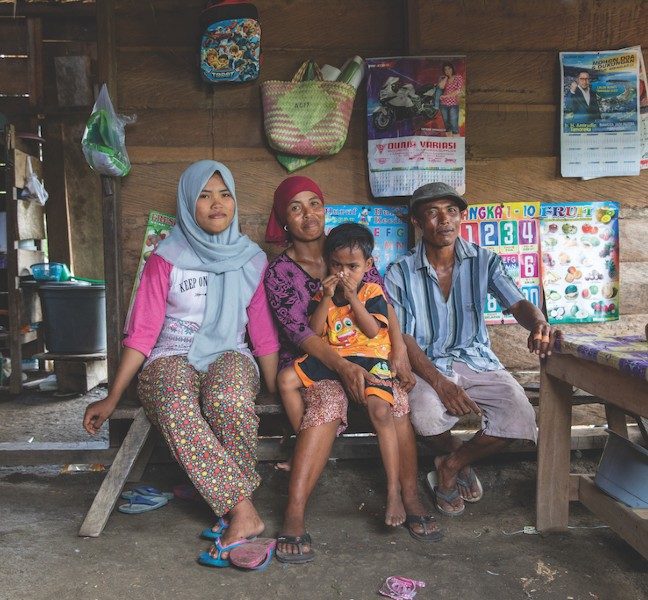
Mulyadi and his family have a thriving cucumber farm next to two hectares of land from the Plasma scheme.
The scheme aimed to extend the benefits of palm oil expansion to rural communities, connecting farmers like Mulyadi with training, seedlings, fertiliser, an instant market for their palm oil and, eventually, title to the land.
But Mulyadi wants out from the scheme. He’s still paying off his debt to the company for clearing the land, equipment, fertiliser and pesticide.
“It takes long to pay the debt because the profit from the palm trees is low,” he says.
Cucumber crops, on the other hand, provide a steady income source for this farming family.
Our partner TuK equipped Mulyadi with a range of sustainable farming techniques and, as a result, his cucumbers are flourishing.
The scheme aimed to extend the benefits of palm oil expansion to rural communities, connecting farmers like Mulyadi with training, seedlings, fertiliser, an instant market for their palm oil and, eventually, title to the land.
But Mulyadi wants out from the scheme. He’s still paying off his debt to the company for clearing the land, equipment, fertiliser and pesticide.
“It takes long to pay the debt because the profit from the palm trees is low,” he says.
Cucumber crops, on the other hand, provide a steady income source for this farming family.
Our partner TuK equipped Mulyadi with a range of sustainable farming techniques and, as a result, his cucumbers are flourishing.